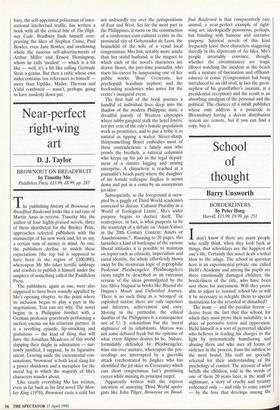Near-perfect right-wing art
D. J. Taylor
BROWNOUT ON BREADFRUIT by Timothy Mo Paddleless Press, £13.99, £8.99, pp. 287 The publishing history of Brownout on Breadfruit Boulevard looks like a sad case of Martin Anus in reverse. Timothy Mo, the author of four highly-praised novels, three of them shortlisted for the Booker Prize, approaches selected publishers with the manuscript of his new work and, let us say, a certain sum of money in mind. As one, the publishers decline to match these expectations (the top bid is supposed to have been in the region of f100,000), whereupon Mr Mo takes terrific umbrage and resolves to publish it himself under the auspices of something called the Paddleless Press.
The publishers, again as one, were also supposed to have been roundly appalled by Mo's opening chapter, to the point where its inclusion began to play a part in the negotiations. You can see why. The novel begins in a Philippine brothel with a German professor gracelessly performing a suction enema on his reluctant partner. It is a revolting episode, lip-smacking and gratuitous — the kind of thing that will have the Jonathan Meadeses of this world slapping their thighs in admiration — nar- rowly justified, I suppose, by its figurative intent. Leaving aside the excremental con- notations, 'brownout' is both local slang for a power shutdown and a metaphor for the moral fog in which the majority of Mo's characters wander about.
Like nearly everything Mo has written, even as far back as his first novel The Mon- key King (1978), Brownout casts a cold but not unfriendly eye over the juxtapositions of East and West. Set for the most part in the Philippines, it turns on the construction of a conference-cum-cultural centre in the provincial city of Gobemador de Leon, the brainchild of the wife of a venal local congressman. Mrs Init, notably more astute than her stolid husband, is the magnet to which each of the novel's characters are drawn: Boyet, the part-time journalist, who starts his career by lampooning one of her public works; 'Boss' Crescente, her psychopath hoodlum nephew; and the freeloading academics who arrive for the centre's inaugural event.
The first half of the book pursues a handful of individual lives deep into the shadow of the modern Philippine state, a dreadful parody of Western cityscapes where tubby gangster stalk the hotel foyers, ten per cent of the city's female population work as prostitutes, and to pay a bribe is as natural as tipping a waiter. Street-sharp, thirtysomething Boyet embodies most of these contradictions: a family man who prowls the brothels, a satirical columnist who keeps up his job in the legal depart- ment of a sinister logging and mining enterprise. A climacteric is reached at a journalist's beach party where the daughter of his female colleague Jingkee is mown down and put in a coma by an anonymous jet-skier.
Subsequently, as the foreground is occu- pied by a gaggle of Third World academics convened to discuss 'Cultural Plurality in a World of Ecological Limits', Mo's wider purpose begins to declare itself. The centrepiece, in fact, is what purports to be the transcript of a debate on 'Asian Values in the 20th Century Context: Assets or Anachronisms?'. Running to 20 pages, this furnishes a kind of burlesque of the various liberal attitudes it is possible to maintain on topics such as ethnicity, imperialism and racial identity, the whole effortlessly blown away by the stentorian logic of coprophilic Professor Pfeidwengeler. Pfeidwengeler's views might be described as an extremist version of the ideas promulgated by the late Shiva Naipaul in books like Beyond the Dragon's Mouth and Unfinished Journey. There is no such thing as a 'wronged' or exploited nation; there are only superiors and inferiors, achievement and envy. Moving to the particular, the ethical dustbin of the Philippines is a consequence not of U. S. colonialism but the 'moral slightness' of its inhabitants. Marcos was not some debased freak but the epitome of what every filipino desires to be. Nature, formidably defended by Pfeidwengeler, wins out over nurture, whereupon the pro- ceedings are interrupted by a guerrilla attack (orchestrated by Jingkee who has identified the jet-skier as Crescente) which cuts short congressman Init's promising career while missing its principal target.
Apparently written with the express intention of annoying Third World apolo- gists like John Pilger, Brownout on Bread- fruit Boulevard is that comparatively rare animal, a near-perfect example of right- wing art: ideologically poisonous, perhaps, but bristling with humour and narrative purpose. Satirical novels of this kind frequently leave their characters staggering dazedly in the slipstream of An Idea. Mo's people invariably convince, though, whether the circumstances are tragic (Boyet watching the incident at the beach with a mixture of fascination and offhand- edness) or comic (Congressman Init being introduced to an old rival, in fact the great- nephew of his grandfather's assassin, at a presidential reception) and the result is an absorbing amalgam of the personal and the political. The chances of a small publisher whose only address is a postcode in Bloomsbury having a decent distribution system are remote, but if you can find a copy, buy it.


























































 Previous page
Previous page